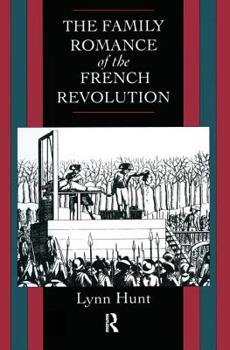The Family Romance of the French Revolution
Select Format
Select Condition 
Book Overview
This latest work from an author known for her contributions to the new cultural history is a daring, multidisciplinary investigation of the imaginative foundations of modern politics. Hunt uses the term Family Romance', (coined by Freud to describe the fantasy of being freed from one's family and belonging to one of higher social standing), in a broader sense, to describe the images of the familial order that structured the collective political unconscious. In a wide-ranging account that uses novels, engravings, paintings, speeches, newspaper editorials, pornographic writing, and revolutionary legislation about the family, Hunt shows that the politics of the French Revolution were experienced through the network of the family romance.
Format:Paperback
Language:English
ISBN:0415867746
ISBN13:9780415867740
Release Date:September 2013
Publisher:Routledge
Length:228 Pages
Weight:0.75 lbs.
Dimensions:0.5" x 6.1" x 9.2"
Customer Reviews
4 ratings
A tough book but well worth the struggle
Published by Thriftbooks.com User , 18 years ago
This is a difficult book on the French Revolution. Lynn Hunt is a brilliant historian who takes European intellectual history and fashions it to understand what was going on in the French Revolution. I will guarantee this is a book to be read at least twice because the first time through you will be very overwhelmed (unless you have a very good knowledge in enlightenment philosophers) and you will need time to assess her ideas. The basics include the nation of France was the same dynamic as a family and the roman ace required the restitution of the family in order to make the country whole. Hunt does not take her theory far enough in the end to include Napoleon as the new father in her reconstituted family but otherwise it is a very interesting analysis. This is not a book for beginners but for those studying the French Revolution they may find it useful. Be warned if you see it on your syllabus make sure you leave time to read it several times over.
Good textbook to hold onto
Published by Thriftbooks.com User , 20 years ago
This is one of those books that leads you to purchase many other books, whether or not you can afford them. "Family Romance" was assigned for one of my college classes and I have picked it up several times since, both as a reference for other research and just to read through. The writing is excellent and the points well-supported. It is only an occasional conclusion that reaches beyond the immediate evidence, and these few are bolstered elsewhere in the work. The only thing that might be lacking is further illustration of cited artwork, the majority of which is far from pornographic (with the exception of the chapter on Sade). I would have liked her to expand more on the role of religion in the family model as well, especially in relation to those who saw themselves as martyrs to the revolution. In the former case, though, most of the works can be found in a general survey of Art History, and the summary of the latter points does not detract from the strength of her main argument. She describes her theory of an unconscious, "collective imagination" thoroughly, and connects it to important figures and events, giving it a chronological shape that makes it both easy to follow and convincing. Just don't follow the footnotes until you have a good savings account built up:)
I am one of those who DOES use this for class
Published by Thriftbooks.com User , 21 years ago
Lynn Hunt is one of the most recognized authorities on this era, she was president of the American Historical Association and she writes pretty well also. So I agree with the other reviewer and have used this book for classes and have not hesitated to adopt it. A community college student majoring in psychology found it very informative, and in that setting as well as at a four-year university I have found the book is highly useful as a course text. The illustrations (woodcut porn, really) provide an instant lesson: the king can and was degraded as a political figure via sexual imagery. In other words, pornography can be political (Larry Flynt isn't a trailblazer, after all). This book will not help someone looking to understand the basics of what happened between 1789-94 but if you have a grasp of that and want to understand more about creating a nation of men as "equals" or "brothers" (no women need apply), then read this book. You might find yourself thinking about it long after reading it (which is when you might really find yourself appreciating it).
Good cultural study of how the Revolution affected women
Published by Thriftbooks.com User , 24 years ago
Please disregard the negative review. Hunt's text is fairly accessible. She describes how the great republican and liberal revolutionaries depoliticized women by emphasizing domesticity. Simply: women could not have political rights or privileges because their biology and psychology directed them toward the home and childrearing. Hunt argues from cultural products: plays, festival, and symbols that the revolutionaries invented to legitimize their ideas (lots of quaint images of home life.) She fails at many points to explain the impact of these images and how widely people could have been affected by them. Many of these products will be unfamiliar to many readers, especially those without knowledge of the literature of the period. Furthermore, I would not recommend the books as a general history of the French Revolution. Even Hunt assumes that you know about the "great story." It is a much better book after you have read several political and at least a few social histories of the revolution. Thereafter, Hunt's books is an excellent counterpoint to the notion that the revolution was liberating--it wasn't!






